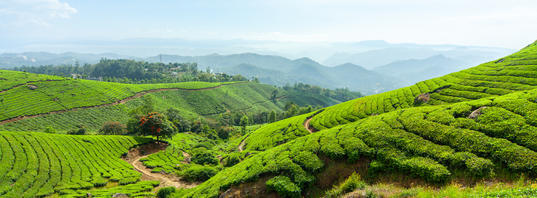Background
The Kerala State Action Plan on Climate Change identifies the Wayanad district of Kerala as one of the ‘climate change hotspots’ in the state. Wayanad is nestled in the Western Ghats, an extension of Deccan Plateau. It is home to crops that are thermo-sensitive and vulnerable to climate change such as coffee, paddy and pepper. It is also one of the eight ‘hottest hot-spots’ of biological diversity in the world, home to nearly 5000 species of flora and fauna.
The Wayanad district is primarily agrarian with 50% of its geographical area falling under plantation and other agricultural land use. 97% of the district’s population are rural, therefore mostly directly dependent on agriculture for their livelihood. Due to this, the district was selected for a community-based climate change adaptation and development initiative named “Carbon Neutral Wayanad”.
As the district is highly vulnerable to the adverse effects of climate change, carbon-neutral development became essential for its people and the environment. Therefore, Meenangadi Panchayat in Wayanad was selected as a model carbon-neutral panchayat for Wayanad district and the rest of the country to follow.
The purpose of this project is to propose sector-wise adaptation and mitigation strategies in Meenangadi by estimating its greenhouse gas (GHG) emissions and carbon sequestration for the baseline year 2017 (based on 2006 IPCC Guidelines for National Greenhouse Gas Inventories).
Results
The project produced a detailed GHG inventory of the Meenangadi Panchayath for the year of 2016-17.
The estimate shows that there was a net GHG emission (the difference between total emissions and total sequestration) of 11,412.57 tonnes of CO2 equivalent in 2016-17. Targets were set to reduce these emissions by adopting various projects in Meenangadi. The process is still ongoing, and several projects undertaken by the panchayat are currently in the implementation phase.
- During the period of 2017-19, Meenangadi Panchayat has planted about 400,000 trees in private land to increase carbon sequestration and revive biodiversity.
- The ‘Tree-banking scheme’ introduced as part of low carbon development has become a source of income for farmers by providing incentives to those who plant and protect trees
- Bamboo is also being promoted due to its high sequestration rates, especially in riverbanks to conserve soil and water.
- Meenangadi has also started implementing energy-efficient measures such as energy auditing, promoting LED bulbs, waste management plants and vermicomposting, etc.
The project anticipates improving the livelihoods of people, adapting to climate change and emerging as a sustainable community.
The methodology developed for Meenangadi Panchayat in Kerala can be adapted by any region or local self-government for planning a sustainable low-carbon economy. The project has resulted in environmental, social and economic benefits, both qualitative and/or quantitative, such as number of training provided, mega watt of solar energy installed, greater acceptance of smart meters among residents, etc.
The analysis was carried out in the sectors of Transportation, Domestic Energy, Electricity, Waste and Agriculture, Forests and Other Land Use (AFOLU).
Enabling conditions
Meenangadi Panchayat is implementing the carbon-neutral project as a comprehensive one that includes all sectors. With financial support from the state government of Kerala, the ‘Tree-banking scheme’ in Meenangadi is being implemented.
Thanal, one of the oldest environmental organisations in Kerala, was entrusted by the Government of Kerala to provide technical assistance to this flagship project.
A number of other organizations, universities, educational institutions, government departments and authorities were also part of this project during various stages along with Thanal. Their participation played a huge role in the successful implementation of this project.
Challenges
Since it is a novel attempt to address climate change at the LSG level, some limitations include:
- Methodology: Due to lack of examples of a GHG inventory at a subnational level, the formation of methodology was quite challenging.
- Data collection: Primary data collection was a major challenge and various sampling strategies were used to get representative data of the panchayat. Most of the secondary data for the inventory was available only at the district level and hence extrapolation based on population and number of households was carried out.
Key lessons learned
- Participation and support of community, authorities, organisations and people across all sectors is essential for successful implementation of such cross sectoral projects.
- Data collection will be an arduous task when the project is done at a subnational level. Primary and secondary data collection will be required, especially while doing a GHG inventory.
- ‘Carbon Neutral Meenangadi’ project shows how successful a ‘bottom-up’ approach is to carry-out low carbon development project towards a climate-resilient future.
